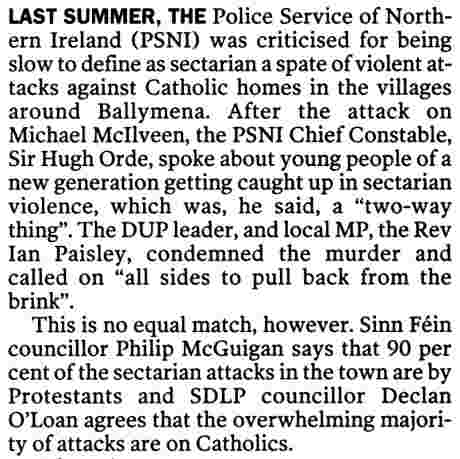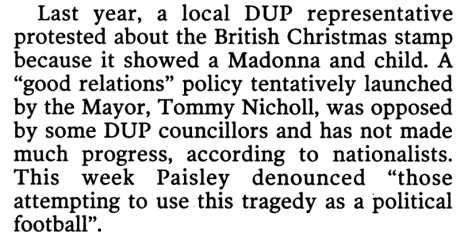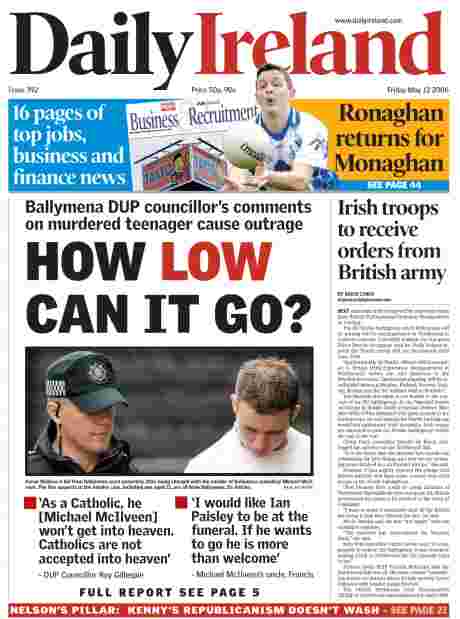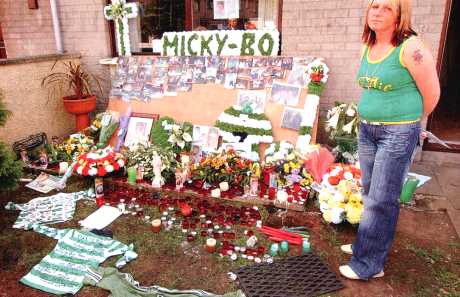Unionist sectarianism - 'all sides' to blame is the unionist refrain
 national |
rights, freedoms and repression |
opinion/analysis
national |
rights, freedoms and repression |
opinion/analysis  Saturday May 13, 2006 23:09
Saturday May 13, 2006 23:09 by James Reilly
by James Reilly
Sectarianism - an inevitable offshoot of British rule
Susan McKay’s article in the Weekend Review section of the Irish Times (May 13 2006 - see link below) explains the background to the unionist sectarian killing of Michael McIlveen in Ballymena. In this DUP heartland over 90% of the sectarian attacks are unionist.
The PSNI calls this sectarianism that is almost universally unionist a “two way thing”. Ian Paisley wants “all sides” to “pull back”. Instead of examining whether unionist ideology is in any way at fault, Paisley warns nationalists in an insulting and bullying manner not to turn the issue into a “political football”.
When events like this awful tragedy occur, it offers a brief insight into the nature of unionist rule. Ian Paisley’s DUP in Ballymena run the borough the way they would like to run the North of Ireland – as a one party state. They think that is the ‘British’ way, majority rule. Those who do not like it do not like ‘Protestant’ British democracy. They are therefore ‘disloyal’. By logical extension ‘Protestant’ unionism sees Roman Catholicism as a problem. Democratic Unionist councillors like Roy Gillespie state that the murdered teenager will not get into ‘Heaven’ and that Gillespie’s religious principles prevent him from attending McIlveen’s funeral. A Roman Catholic nationalist expressing parallel sentiments with regard to an innocent murdered Protestant would be driven from nationalist politics. Mr Gillespie’s sentiments are in many ways typical. Ian Paisley, Roy Gillespie’s leader, also sees the religion of the boy and his family as that of the ‘Anti Christ’ Pope, and will not take up the father’s invitation to attend the funeral.
Southern evolution
The South of Ireland broke free from British rule in 1921 in order to escape a form of rule based on racist and sectarian principles, then based on Empire, in favour of a more tolerant civil society (though this would not have been clear from the aftermath of the victory of right-wing forces in the Civil War and the British enforced Treaty settlement).
British rule in any part of Ireland is unstable and bound to rely in the final analysis on sectarianism. The ideology that drives unionist sectarianism is based on its semi-detached relationship with the British state; one the latter has no intention of further cementing.
Institutionally sectarian
Is the North institutionally sectarian? I would say it is. The British Police in London were found to be “institutionally racist” by William McPherson’s official enquiry into the April 1993 racist murder of black teenager, Steven Lawrence. Consider the nature of unionist sectarian attacks in Northern Ireland, that have “never gone away”, that have not been adequately covered by the media, and that were even encouraged by political unionism. What does that make the northern state? ‘Institutionally sectarian’ seems the obvious answer. All other things being equal, the north finds its reason for existing in oppressing nationalists, identified as Roman Catholics. The annual orgy of Orange marches – 2,000 between Easter and September – maintains a strict code of sectarianism within civil society. Protestants are intimidated into line by a monolithic form of politics.
Sectarian “observers”
A state in which leading representatives of the Dominant political party, the DUP, attend loyalist blockades on Roman Catholic schools (Holy Cross in Belfast) and churches (Harryville, near Ballymena) as “observers” is palpably sick politically, by any normal definition of political health.
This unionist outlook is the reason why unionists are not allowed the normal democratic right of ‘majority rule’ – in a state originally carved out for their exclusive use. They are not trusted to rule fairly or with an ability to win legitimacy. It is the reason why ‘choice’ was removed from unionism. It is necessary if the state is to be in any way viable politically. In effect unionists have been given a state they are not allowed to rule exclusively, apart from where they have a local government majority in the exercise of limited powers of local government in the North. Those limitations were imposed after the start of the Troubles in 1968 when it was found, for instance, that unionists ruled areas like Derry and Strabane, areas they were a local minority, through gerrymander.
“Kith and kin”
There is little evidence that Unionism has evolved politically since 1921, the wider world is always seen through sectarian glasses. When Britain had an Empire, unionists supported it. When minority white Rhodesians under Ian Smyth declared a racist UDI in 1964, the Reverend Martin Smyth, former Unionist MP and head of the Orange Order, referred to white Rhodesians as unionism’s “kith and kin”. When Britain declared itself ‘multicultural’, unionism did so also. Unionism’s ‘Protestant’ culture and Orange Order marches through nationalist areas were classed as just one part of the fabric of the tolerant ‘British’ state – opposition was by definition intolerant. I write ‘British’ in inverted commas since the name of the state, the ‘United Kingdom of Great Britain and Northern Ireland’, is a denial of the ‘Britishness’ of Northern Ireland. Unionists state that their problem in declaring their Irishness is due to the disloyal actions of nationalists. Since nationalists are disloyal by definition, this is a simple self-replicating justification.
Recognition of these truths leads to recognition of one of the flaws in the Good Friday Agreement. It is the right of unionists to have a veto over the formation of the Executive, the right of unionists to deny nationalists their right to rule with the representatives they have chosen. The other flaw is majority rule in local government. Resolving these strangleholds on progress will break the sectarian stranglehold on politics in the North. It will also break up the unionist monolith and the sectarian basis of the northern state. It will therefore cause unionism to fracture by removing its sectarian power base.
‘Wise’ Man
If Ian Paisley is ‘wise’ (in his own terms) therefore, he will stick to his sectarian ‘principles’ and not darken the door of a Roman Catholic Church to attend the funeral of a murdered constituent. British rulers, the final arbiters, will decide whether the choice Paisley makes is to be rewarded or punished. After all, Ian Paisley is ‘theirs’ politically, as are those who murdered Michael McIlveen.
Sectarianism is pursued as a defence, or as an assertion, of ‘Britishness’. It is up to the British to decide what attitude to take to the actions and outbursts carried out or uttered in their name.

Picture of Michael McIlveen being kissed by Protestant friends - text indicates nexus of unionist sectarianism (McKay IT 13 May 06)

Unionist sectarianism, a "two-way thing", says PSNI's Hugh Orde (McKay IT 13 May 06)

The DUP world view: "croppy lie down" (McKay IT 13 May 06)

Daily Ireland exposes DUP's sectarian underbelly - Paisleyite politics for the 21st Century
